travel hacks
What’s the difference between coliving, Airbnb, hostels, and hotels?
A guest post from our friends at Outsite
Traveling soon? You might be checking out coliving spaces, Airbnbs, and hostels in the area, trying to figure out which option is best for you.
This is a guest post from our friends at Outsite!
Airbnbs, coliving spaces, hostels, and hotels offer very different accommodation experiences.
Generally, when looking for accommodation, digital nomads need to prioritize fast Wifi, a good location, and the social aspect of the experience.

What is a coliving space?
A co-living space is similar to a coworking space - but there are bedrooms as well as shared workspaces, living spaces, and extra facilities. The people using coliving spaces are generally working remotely or in search of a calm place to stay. There’s typically a vested interest in the community aspect, as those living there have booked for an extended stay.
Pros:
- Easy to make new friends
- Affordable for long-term trips
- Fast Wifi and workspaces
Cons:
- Not ideal for 2-night stays
Why would you use Airbnb as a digital nomad?
Airbnb offers so much variety in terms of accommodation. You can book your own apartment or a single room, sharing the property with your host. Airbnb is sometimes the best option if you’re looking for your own space, however, coliving is still the better option when you’re looking to meet people as you travel.
Pros:
- There’s plenty of choice in terms of rooms or apartments
- Options for different budgets
Cons:
- Wifi can be very unreliable
- Unlikely to meet anyone else

Are hostels a good option for digital nomads?
You might be tempted to save money by choosing a hostel for your coworkation. There are now coworking-style hostels for those who do want to save money, like Selina. However, generally, the guests using hostels are less invested in keeping the space calm and focused, and more interested in socializing with new friends. It depends on what you’re looking for from your experience!
Pros:
- This is a very cheap form of accommodation
- Easy to meet people
Cons:
- Lack of workspace
- Not a great environment for working
Do digital nomads often use hotels?
Hotels are often overlooked for digital nomad trips. The architecture of the space is not conducive to meeting other guests, and they tend to be more expensive than other options. That said, businesses like the Ace Hotel have adapted to the remote work revolution, building their lobbies into shared workspaces.
Pros:
- High-quality accommodation
- Perfect for short stays
Cons:
- Not easy to meet people
- Expensive compared to other options
What is an Outsite?
Outsite is a network of coliving spaces, however, they also have 4,000 Members within the community. The coliving spaces range from apartments in Lisbon to spacious lodges in Tahoe and surf villas in Costa Rica. There are 40+ different nationalities within Outsite, so you can easily make friends from around the world.
There’s an App for connecting with your housemates when you’re in the house, and for connecting when you’re on the road too. Check out Outsite’s locations.